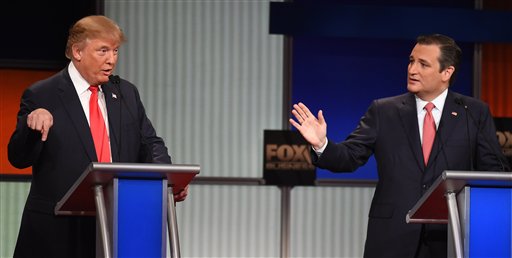
Republican presidential candidate, businessman Donald Trump, left, speaks as Republican presidential candidate, Sen. Ted Cruz, R-Texas, speaks during the Fox Business Network Republican presidential debate at the North Charleston Coliseum, Thursday, Jan. 14, 2016, in North Charleston, S.C. AP PHOTO
NORTH CHARLESTON, South Carolina— Ending months of civility between two fiery contenders, billionaire businessman Donald Trump doubled down on his questions about Texas Sen. Ted Cruz’s eligibility to serve as president, telling his rival that his birth in Canada leaves “a big question mark on your head.”
Thursday’s Republican Party debate — the first of the year — came less than three weeks before the Iowa caucuses kick off this year’s voting. Trump has led the Republican field for months, confounding Republican leaders and many of his rivals.
“You can’t do that to the party,” he said.
Cruz forcefully defended his ability to serve as president. He suggested Trump was only turning on him because he’s challenging Trump’s lead, particularly in Iowa, which kicks off voting on Feb. 1.
“The Constitution hasn’t changed — but the poll numbers have,” Cruz said. The senator was born in Canada, but his mother is American, which legal scholars agree fits with the Constitution’s provision that only a “natural born citizen” may be president.
READ: Trump extends lead; Republican rivals attack as debate nears
The heated exchanges signaled an end to months of relative civility between Trump and Cruz, both of whom are appealing to Republican voters deeply frustrated with Democrats in Washington and sometimes with their own party leaders.
Cruz renewed his criticism of Trump’s “New York values,” a coded questioning of Trump’s conservatism that elicited an unexpectedly emotional response from the real estate mogul about his hometown’s response to the Sept. 11, 2001, attacks.
“No place on earth could have handled that more beautifully, more humanely than New York,” Trump said. “That was a very insulting statement that Ted made.”
Cruz also defended his failure to disclose loans of some $1 million from Wall Street banks on federal election forms during his 2012 Senate campaign, saying it was little more than a “paperwork error.”
Underscoring the split in the party that has defined the turbulent Republican primary, the more mainstream candidates on stage fought to edge their way into the debate.
On the economy and national security, the candidates offered a sharp contrast to the optimistic portrait of the nation President Barack Obama outlined in his State of the Union address earlier this week, warning that sticking with Democrats in the November election could have dire consequences.
“On Tuesday night, I watched story time with Barack Obama, and it sounds like everything in the world was going amazing,” New Jersey Gov. Chris Christie said.
On national security, former Florida Gov. Jeb Bush suggested the country was less safe under Obama and declared Hillary Clinton, the Democratic front-runner, would be a “national security disaster.”
Florida Sen. Marco Rubio went even further, saying Clinton was “disqualified for being commander in chief,” accusing her of mishandling classified information and lying to the families of Americans killed in the 2012 attacks in Benghazi, Libya.
Rubio likened Christie’s policies to President Obama’s, particularly on guns and education reform — an attack Christie declared false. Seeking to undermine Rubio’s qualifications for president, Christie suggested that senators “talk and talk and talk” while governors such as himself are “held accountable for everything you do.”
Trump stuck with his controversial call for temporarily banning Muslims from the United States because of fear of terrorism emanating from abroad. He said he had no regrets about the proposal and noted that his poll numbers rose after he announced the plan.
READ: Trump defends call for banning Muslims from United States
Thursday night’s debate came at the end of a week that has highlighted anew the deep rifts in the Republican Party. South Carolina Gov. Nikki Haley, a rising Republican star, was widely praised by many party leaders for including a veiled criticism of Trump’s angry rhetoric during her response to Obama’s State of the Union address — only to be chastised by conservative commentators and others for the exact same comment.
Trump said he wasn’t offended by Haley’s speech and argued his anger is justified.
Tighter rules for Thursday’s debate, hosted by Fox Business Network, resulted in a smaller cast of candidates in the main event. Businesswoman Carly Fiorina was bumped to the undercard event, as was Kentucky Sen. Rand Paul, though he chose to not participate in the early evening contest.
Republicans have one more debate scheduled before voting begins in Iowa.